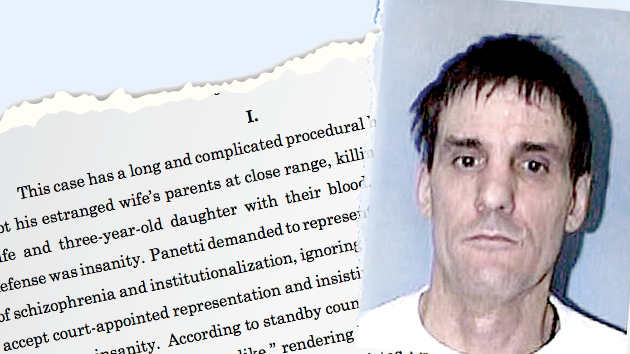
Governor Rick Perry (R) and former Texas congressman Ron Paul.Paul Sancya/AP
When Scott Panetti represented himself in a Texas capital murder case in 1995, wearing a purple cowboy suit and calling himself “Sarge,” he called as a witness a veterinarian who once lived across the street from him. Panetti questioned the vet about the time he euthanized Little Blue, Panetti’s old dog. The episode had nothing to do with the case. Other witnesses Panetti tried to call to the stand: John F. Kennedy and Jesus.
Trial transcripts, medical records, and expert witness testimony have documented that Panetti suffers from severe schizophrenia. He believes Texas is going to execute him to stop him from preaching the Gospel—not because he shaved his head, donned camo fatigues, and shot and killed his in-laws in 1992. The Supreme Court has declared that executing the mentally ill violates the Eighth Amendment’s prohibition on cruel and unusual punishment, but several Texas and federal courts—including the US Supreme Court—have reviewed Panetti’s case, and each one has ruled that the state can proceed with his lethal injection. Now, with Panetti’s execution scheduled for December 3, the only thing that might save him is a national campaign being mounted by conservatives, including former Texas Republican congressman and libertarian icon Ron Paul.
Panetti’s lawyers have filed a clemency petition with the Texas Board of Pardons and Parole, which can recommend that Gov. Rick Perry, a Republican, commute Panetti’s sentence to life in prison without parole. That petition has received an outpouring of support from conservatives and evangelicals. In addition to Paul, this group includes Jay Sekulow, an evangelical lawyer famous for pressing religious liberties cases on behalf of social conservatives, who on November 12, joined with 49 other evangelical leaders to send a letter to Perry on Panetti’s behalf.
This week, the list of conservative supporters grew as more prominent figures sent a new letter to Perry urging clemency. Among those signing: former Virginia attorney general Ken Cuccinelli; Dave Keene, opinion editor of the Washington Times; Reagan biographer Craig Shirley; American Enterprise Institute scholar Charles Murray; Floyd Brown—best known as the producer of the famous Willie Horton ad during the 1988 presidential campaign; longtime Republican National Committee member Morton Blackwell; Maggie Gallagher, the former head of the anti-gay marriage group National Organization for Marriage, and many others. They write, “Mr. Panetti is one of the most seriously mentally ill prisoners on death row in the United States. Rather than serving as a measured response to murder, the execution of Mr. Panetti would only serve to undermine the public’s faith in a fair and moral justice system.”*
Paul’s involvement in the case is unusual. Last year, he publicly endorsed a new advocacy group, Conservatives Concerned About the Death Penalty, saying, “I believe that support for the death penalty is inconsistent with libertarianism and traditional conservatism.” This was the result of a years-long evolution. In 2007, Paul noted, “There was a time I simply stated that I supported the death penalty. Now my views are not so clearly defined…After years spent in Washington, I have become more aware than ever of the government’s ineptness and the likelihood of its making mistakes. I no longer trust the US government to invoke and carry out a death sentence under any conditions.” But Paul at that time didn’t believe that the federal government should interfere with state executions.
Now that he’s out of office, Paul’s gone further, and he has come out firmly against Panetti’s execution. Heather Beaudoin, the coordinator for Conservatives Concerned About the Death Penalty, says that this is the first time she’s aware of that Paul has weighed in publicly against an execution.
It’s also unusual for conservative Christians to support a clemency petition like Panetti’s. The last time evangelicals really rallied en masse to prevent a pending execution was in 1998, in the case of Karla Faye Tucker, who converted to Christianity in prison and became a conservative cause célèbre. Despite the pleadings of evangelicals such as Pat Robertson, then-Texas Gov. George W. Bush, went ahead with the execution, and Tucker became the first woman executed in the state since 1863.
The Panetti case is different. His religious fervor is the product of a brain disorder, and the evangelicals’ opposition to his execution is not related to his religious proclamations. It is more of a reflection of the shift in public attitudes regarding capital punishment that has been driven by the growing number of exonerations of death row inmates, the high number of mentally ill and disabled people sentenced to die, and the inefficient and expensive administration of capital punishment. “A lot of conservatives are late to realize that the whole criminal-justice system is part of the government,” says Richard Viguerie, a prominent conservative leader and an ardent opponent of the death penalty.
Religious conservatives are increasingly joining those who would like to see the end of the death penalty, citing their movement’s commitment to a “culture of life,” which has traditionally focused primarily on restricting abortion. Conservative evangelicals, says Beaudoin, have been animated by the Panetti case over the past few weeks. Her outfit has opposed other executions, but, she says, the Panetti case has hit a nerve. She has been surprised by the number of influential Christians who have signed on to the clemency petition, especially Samuel Rodriguez, the president of the National Hispanic Christian Leadership Coalition, who’s on Time magazine’s 2013 list of the 100 most influential people in the world. Abby Johnson, a former Planned Parenthood clinic director who now runs a pro-life ministry for former abortion clinic employees, wrote an editorial in the Dallas News calling on Texas to spare Panetti.
“This is the largest outpouring of support on a death penalty case we’ve seen from evangelicals, and you can see why, given the ridiculous nature of this case,” Beaudoin says. “A lot of folks who signed this [clemency] letter might have given pause about signing on to a letter opposing the death penalty generally, but they think we have no business executing Scott Panetti.” She adds, “As Christians, we’re called protect the most vulnerable. And there’s just no question that Scott Panetti is in that number as someone who’s suffered from severe mental illness. We all want to keep society safe, but I’m thankful there are other ways to do that than executing people.”

But can conservatives and evangelicals persuade Perry? The Texas governor is deeply tied to the religious right, which enthusiastically backed his gaffe-heavy run for the White House in 2012. So he might want to be sympathetic to their crusade. And as a lame-duck governor, Perry doesn’t have to worry about his reelection prospects in the state that leads the nation in executions. Moreover, Perry has joined with other conservatives in pushing to reform the criminal-justice system, particularly regarding harsh mandatory minimum drug sentencing.
Yet Perry has overseen more executions than any American governor in recent history—10 this year—and he has never shown any qualms about executing the mentally ill before. The most notable instance of this was the case of Kelsey Patterson, a man suffering from paranoid schizophrenia.
In 1992, a few days after his brother tried to have him committed to a mental hospital, Patterson shot and killed two people. After the shooting, Patterson stripped down to his socks and paced the street naked and shouting until he was arrested. During his trial, Patterson insisted that the military had implanted a device in his ear and was controlling him. The Texas pardons board recommended Perry spare Patterson’s life, but Perry ignored the board and went forward with Patterson’s execution anyway.
Perry is now pondering joining his party’s 2016 presidential fray, and there’s no telling if a grant of clemency for Panetti could provide political fodder in what is expected to be a crowded field of candidates. But the Panetti case could give Perry the opportunity to show a more compassionate side of himself to an American electorate in which support for the death penalty is at an all-time low.
Young people, and young evangelical Christians in particular, are moving away from supporting capital punishment in large numbers. A poll conducted last summer by the Barna Group, a Christian public opinion research firm, found that about half of practicing Christian baby boomers support the death penalty, but only 23 percent of Christian millennials felt that way. (Barna also asked the survey-takers, “What would Jesus do?” and found that only 5 percent of Americans—and 10 percent of practicing Christians—thought Jesus would support the death penalty.)
“The younger generation is finding that it doesn’t make a lot of sense to say we’re pro-life and then be out front promoting executions,” says Beaudoin, who at 30 is one of those pro-life/anti-death-penalty millennials.
Perry’s options in Panetti’s case are limited, as a pro-death-penalty bias is baked into Texas law. Unlike many other states, Perry doesn’t have the power to single-handedly commute Panetti’s sentence to life in prison without parole. He can only do so if the pardons board recommends clemency, which the board has only done only four times since 1982 regarding an imminent execution. He can ignore a recommendation for clemency and move forward with an execution, but he can’t ignore a denial of a clemency petition and on his own spare a life. But Perry appointed all the sitting board members. It seems likely that if he urged them to advise clemency for Panetti, they would take him seriously.
Perry can unilaterally grant Panetti a one-time 30-day stay of execution, which Panetti’s lawyers have requested so that he can have a new mental competency evaluation. Panetti hasn’t been evaluated by mental-health professionals in seven years, and his lawyers argue that new documents disclosed by the Texas Department of Criminal Justice indicate that his mental health has deteriorated significantly since then. (He now believes a listening device has been implanted in his tooth and that “Satanic graffiti” has been appearing on the walls of his cell.)
If such an evaluation finds Panetti doesn’t have a rational understanding of his impending execution, Panetti can ask the court to stay his execution and hold a hearing to evaluate whether he’s sane enough to be executed. So far, all of the Texas state courts have denied the request for a new competency evaluation, including the Texas Court of Criminal Appeals, which rejected Panetti’s appeal Tuesday in a 5-4 vote. But the dissent in that decision suggests that Panetti’s case is prompting serious debate, even among Texas’s conservative judges. In her dissent, Perry appointee and Republican judge Elsa Alcala said the decision, at worst, “will result in the irreversible and constitutionally impermissible execution of a mentally incompetent person.”
Gabriel Salguero, the president of the National Latino Evangelical Coalition and one of 50 evangelical leaders who signed a letter asking Perry and the board of pardons to spare Panetti, says that Perry is well aware that evangelicals—and Latino evangelicals in particular—are a fast-growing demographic nationwide. But, he adds, this decision is “not about politics. It’s about morality and what kind of country we want to be.” He believes saving Panetti is “an easy lift…We don’t execute people with mental illness, just as we don’t execute minors.” And he hopes Perry will come around: “We will be entering the Advent season, the high holy days. It seems to me the right message is to talk about saving lives. Maybe we’ll get an Advent miracle in Texas.”
*This story was updated on December 1, 2014 to include the recent letter to Perry by additional conservative supporters of Panetti’s clemency petition.
















